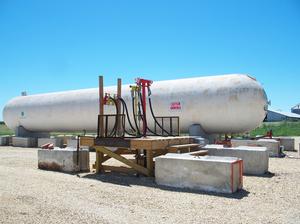|
|
||||

Is Your Flow Too Slow?
Profitability, productivity, and safety are three elements, which are essential for success in today’s agricultural business. Some say that it is impossible to have all three; we disagree.Anhydrous ammonia or NH3 is a highly effective fertilizer. It carries with it requirements for specialized equipment, special handling and unique safety measures which are not required with other products. Due to the fact that we all share weather patterns, seasonal readiness, and work limitations we also share a rather small window of application opportunity. When the nurse tanks are lined up, waiting to be filled, and you are unable to keep up with your customers’ needs, it will cost you money and possibly future business. NH3 stored in your bulk tanks is of no benefit to your customers or you. First, and foremost, you must provide a safe environment for your employees and your customers. This is controlled by three primary factors, equipment, methodology, and human behavior. If your plant is designed well, and your equipment is well installed, properly inspected, and well maintained, you have a foundation for safety and production. Secondly, your plant must be designed to give you fill speed without cutting corners. This is controlled by two factors; plant layout, and equipment. Thirdly, your employees must clearly understand how to best operate the equipment, best practices, and emergency procedures. In today’s competitive market, with workmen’s compensation insurance, ammonia, and labor prices continually escalating, it is essential that you make the most of what you have. An employee who takes too much time to fill a tank keeps the customer waiting and costs you money. Unsold ammonia represents a burdening cost of inventory, and the worst thing of all is an injured employee or customer. The impact of which could be catastrophic. At Cooperative Services, we have made it our goal to provide innovative designs and solutions, which will safely increase your plant’s throughput. Our designs typically yield average fill times of ten to twelve minutes on a four fill station set-up. Our welded systems provide durability, speed, safety and longevity. Plant improvements are an investment. As such you should determine if it is a worthwhile goal for your business. You can consider that on average an anhydrous system will last a little more than fifteen years, if it is well maintained. Given that lifespan the reduced labor costs, increased production and improved customer satisfaction will give you the increased profit that you need to make your plant state-of-the-art. To determine your needs consider the following: • Is your plant safe and up to date to the current ANSI Standards? • Are your customers’ needs met, or are they waiting for product? • Is your system too slow to meet your production goals? • Do your employees work overtime to meet customer needs? • If your throughput was increased would you need additional nurse tanks? • Are doubles difficult to safely and efficiently, fill? • Is your 2” system maxed out, and are you limited by the 2” nozzle size? If all of this strikes a chord with you, we will be happy to discuss your profitability, productivity, and safety. |

